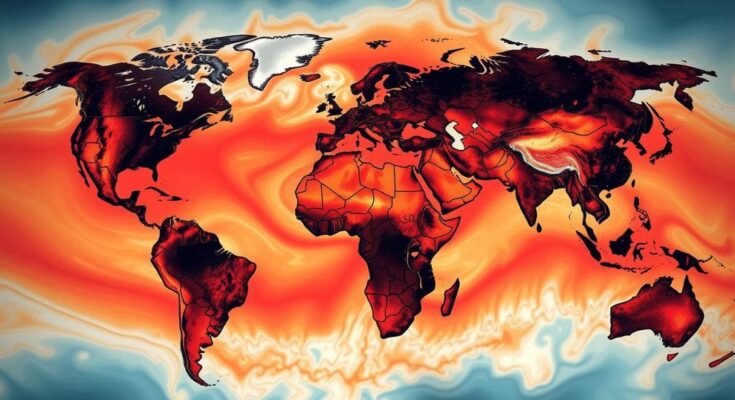In 2024, scientists declared the first full year with global temperatures exceeding 1.5 degrees Celsius above pre-industrial levels. Confirmed by the Copernicus Climate Change Service, the average temperature rose to 1.6 degrees; this trend signals urgent action is necessary to prevent worsening disasters. Climate change’s impacts are visible globally, stressing the need for accountability and immediate emission reductions to align with international climate agreements.
On Friday, scientists reported that 2024 marked the first full year in which global temperatures surpassed 1.5 degrees Celsius above pre-industrial levels. This significant milestone, confirmed by the European Union’s Copernicus Climate Change Service (C3S), highlights the unprecedented warming caused by climate change. Carlo Buontempo, the director of C3S, noted that each month of 2024 was either the warmest or second warmest on record. The average global temperature rose to 1.6 degrees Celsius compared to the period between 1850 and 1900, underscoring the alarming trend of rising temperatures.
Last year stood out as the hottest year on record, and the past decade has featured some of the warmest years ever documented. The UK’s Met Office corroborated the breach of the 1.5-degree threshold, while estimating a slightly lower average temperature of 1.53 degrees Celsius. According to the 2015 Paris Agreement, global leaders are expected to contain average temperatures to avoid excessive climate disasters, though the recent data suggests that the targets may be at risk. Buontempo emphasized the urgent necessity for countries to cut emissions to avert further dangerous warming.
Climate change implications are now evident globally, impacting populations from the wealthiest to the poorest nations. In California, wildfires have claimed at least five lives this week, a stark example of the disasters plaguing various regions. Fires devastated Bolivia and Venezuela, while catastrophic floods affected Nepal, Sudan, and Spain. Furthermore, heatwaves caused thousands of deaths in Mexico and Saudi Arabia. These extreme weather events are exacerbated by climate change, as warmer air holds more moisture, resulting in severe precipitation.
Despite the escalating risks associated with climate change, political motivation for implementing emission reduction strategies has diminished in certain countries. U.S. President-elect Donald Trump has labeled climate change a hoax, contradicting the scientific consensus regarding its human origins and severe consequences. In 2024, the United States experienced 24 climate-related events with damages exceeding $1 billion, including notable hurricanes.
Chukwumerije Okereke, a professor at the University of Bristol, remarked that the 1.5-degree milestone should prompt key political figures to take decisive action. “Despite all the warnings that scientists have given, nations… are continuing to fail to live up to their responsibilities,” he stated. Furthermore, atmospheric carbon dioxide levels hit a record high in 2024, underscoring the critical nature of the climate emergency. Zeke Hausfather, from Berkeley Earth, projected that 2025 will likely remain among the top three warmest years on record, influenced by human emissions and the transitioning of El Nino to La Nina.
The urgent need for global cooperation and commitment to mitigating climate change is more apparent than ever, as the planet experiences unprecedented warming and its dire consequences.
The report from scientists regarding the unprecedented global temperature rise indicates a critical moment in climate science. The increase of 1.5 degrees Celsius above pre-industrial levels signifies the looming consequences of human activity on climate. The Paris Agreement aims to keep global temperature rise well below this threshold to avert severe climate impacts. Recent events highlight the growing intensity of climate-related disasters and stress the necessity for immediate action from global leaders.
In summary, 2024 has been recorded as the first complete year wherein global temperatures exceeded 1.5 degrees Celsius above pre-industrial levels, marking a concerning milestone in climate change. The implications of this warming are felt worldwide, with various catastrophes occurring as a direct result. Political will to address these issues is weakening in some quarters, despite scientific findings urging immediate action. The time to decisively confront climate change is critical as nations face both present consequences and future threats.
Original Source: www.straitstimes.com




